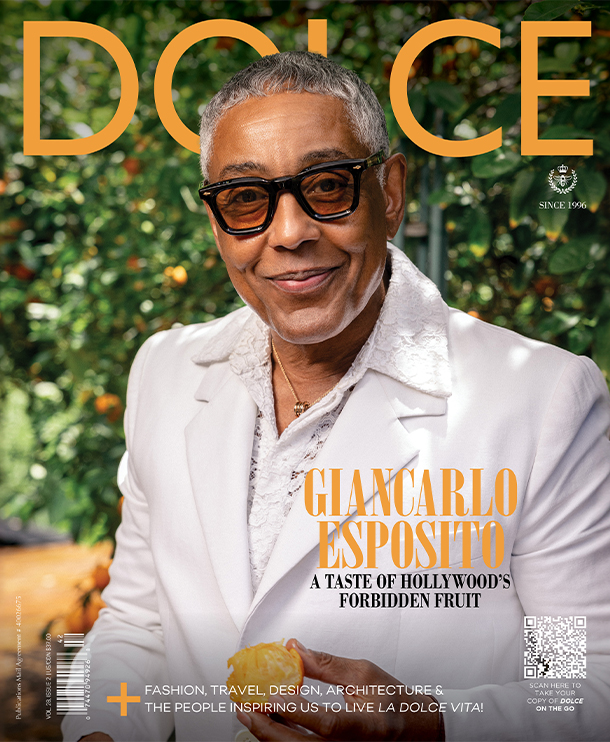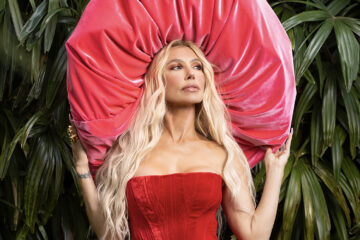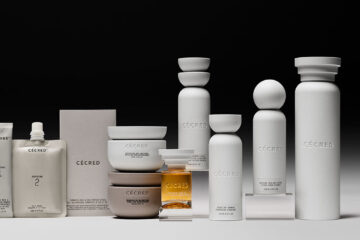The King of Snapchat, DJ Khaled
Music mogul and multi-platinum, award-winning artist DJ Khaled raps about his family, his gratitude, appreciation and spiritual connection to God, his dynamic relationship with his fans and his celebrated collaborations with music icons such as Drake, Rihanna, Jay-Z and Beyoncé.
Interview By Sarah Kanbar
The excitement hits the roof as our black Uber Cadillac pulls up to the guardhouse of DJ Khaled’s gated community. His neighbourhood is one of manicured lawns and house upon house of celebrities.
With thumping hearts, we wait breathlessly as the guard checks our IDs, validating each photo against each crew member in our vehicle. After what feels like an hour, the guard gets the OK from the person on the other end of his receiver. We’re fly. Dolce is in. As our car cruises soundlessly through the beautiful wrought-iron gates, the crew lets out a collective sigh of relief. While Dolce’s interview and photo shoot were agreed upon several months in advance with Khaled’s people, in his fast-paced, high-demand, star-studded 24-7 celebrity, things can change in a split second.
Scouting out the best locations to shoot in Khaled’s mega-mansion is our first order of business. As we walk around, we’re struck by how quiet the house is. The family is still asleep from the previous evening’s event, although housekeepers, cooks and staff are already busy setting up for tonight’s party to mark the second season of Khaled’s show, The Four. Tonight’s festivities will feature the show’s stars, as well as other famous friends of Khaled. We finish our scouting and settle in to wait for Khaled. As the minutes turn into hours, anxiety plays heavy on all of our minds. Are we actually going to get some time with Khaled? Will it be enough? Will we be able to execute the spectacular photo shoot we’ve planned?
We know Khaled is home — he gives us a brief nod from a balcony at one point in our long wait — but he’s constantly on the phone, taking call after call. In between, he takes short breaks to play with his son, Asahd, or to instruct the staff on what needs to be done for the party. Things are already in countdown mode for the evening’s event celebrating the success of The Four.
Our minds are put at ease somewhat when his wife, Nicole Tuck, comes in to greet us and asks if Asahd can take his swimming lesson prior to the shoot.
And after what seems like an eternity, finally the world-famous DJ, celebrity collaborator and father of Asahd, is standing before us, apologizing for the delay. “But, as you know, I am a busy man,” the legend tells us. “I am also a father, and you know, family comes first. We also have a party going on at five, so, let’s do this.” With that, the Dolce crew gets down to logistics — locations we want to shoot in, the wardrobe we’ve selected — the list is extensive. At last we’re in motion, in the midst of our own “collab” with the man whose often-memed catchphrases have inundated us: “We the best.” and “Bless up.” In the background, his staff rushes off to get his gleaming white Maybach Landaulet convertible, top down.
God-driven. Family-focused. Music industry mogul. DJ Khaled is all of these, as well as a multi-platinum, award-winning recording artist, producer, radio personality, record label executive, New York Times best-selling author and extraordinary artistic collaborator. He’s also famous for the many memes made about him, such as: “That’s a nice song you got there … mind if I yell my name on it?” and “Congratulations, you played yourself.” In fact, Khaled’s 26,000 plus posts on Instagram and Twitter (@djkhaled) and his 11.7 million followers have made him famous for an inordinate amount of unusual things. These include his intimate, tell-all, 3 a.m. posts on Snapchat (djkhaled305), his collabs with famous stars, his motivational quotes and tweets, and recently, the attention on his two-year-old son, Asahd Tuck Khaled.
And while it may appear to the uninitiated that Khaled burst onto the scene in 2016, his debut album actually dropped in 2006.
Eric Alper, music industry expert, worked with Khaled on his 2006 debut album, as well as his next three. Alper did the PR for Khaled’s four albums in Canada, including all the media relations and interviews.
“I didn’t think he would blow up as big as he did. Nobody did,” Alper says. “We all knew that he was talented, but it wasn’t until Khaled started the idea of repetition in his songs that he really blew up. He started using catchphrases like ‘We the best’ and ‘We run this town,’ and that’s when it started to explode for him, which was on albums two and three. We went gold in Canada before [in] the States; without much radio play, he was mostly being played in clubs.”
Watching my parents work so hard, I knew as I grew up I needed to work hard, too – DJ Khaled
DJ Khaled, a Palestinian-American, was born in New Orleans, but raised in Florida. “I’m a Miami boy,” Khaled says. “My childhood was a blessing. Florida is so multicultural, and there were so many great vibes. I was on pirate radio, 99 Jamz, playing in all the clubs and producing in my garage. It’s coming from the bottom to where I am now.”
As a kid, Khaled dreamed of being a music executive, not to mention a music mogul. His parents played Arabic music, and Khaled started to play rap and soul music at a very young age. In his teenage years, he was DJing at clubs, playing reggae, dance hall, and hip hop music. “He didn’t really play an instrument, but he had knowledge of what songs were cool from the ’60s, ’70s and ’80s that he could sample from. He knew how to create a beat, make a rhythm and freestyle,” Alper says.
Wherever he went, Khaled was the DJ, the party person, the producer. Raised to be an entrepreneur, he initially pursued a career on the radio and ended up with a No. 1 show. “Growing up, I was around my parents a lot — they would take me to work with them. They worked hard. My dad, who would do anything for us, taught us respect, how to love God and how to work hard. We learned to respect people and show love. Watching my parents work so hard, I knew as I grew up I needed to work hard, too,” Khaled says. “I was blessed to be around people who loved me and showed me how to be a good father.”
It is a lesson that Khaled took to heart and fulfilled the minute his son, Asahd, was born two years ago. Khaled is fiercely proud of his son and takes him virtually everywhere, including the golf course, music award festivities and, of course, his music studio. “Asahd super loves being in the studio with me. He loves to look around and touch the equipment. He is going to be the executive producer of my new album, Father of Asahd, because he is the energy of it. The highest honour of respect is when someone greets me as ‘Father of Asahd’; it touches my heart.”
When Asahd was one, he was partnered with Jordan Brand to launch “Jordan Kids.” He is the brand’s youngest collaborator. Now, the two-year-old also has the Asahd Khaled Collection, a limited-edition line of kids’ apparel and accessories. He was featured as the “Toddler Mogul” on the cover of Miami’s South Beach Ocean Drive Magazine, and he has two million followers on Instagram.
The highest honour of respect is when someone greets me as ‘Father of Asahd’; it touches my heart – DJ Khaled
The year 2016 was a bumper one for Khaled. It was the year he commandeered the world stage and became a star, with a resounding collection of firsts. His novel, The Keys, was published; his son, Asahd, was born; and his album, Major Key, hit gold, his first to do so. While the birth of his son was huge for him and his wife (“Mama Asahd, she’s my queen”), his career completely exploded.
Although he already had eight albums to his credit, it was the release of Major Key (Epic Records) in 2016 that detonated his career. With social media platforms like Snapchat, Instagram (where he could now post videos) and music-streaming platforms like Spotify and Pandora, Khaled could instantaneously direct people to log on and listen to his music. With his audiences being major users of these social media platforms, the timing was ripe for an outsize, flamboyant personality like Khaled to take control.
“Khaled used the greatest television screen ever invented, the iPhone,” Alper says. “Once he started Snapchatting about his rules on life, his family and his methods of success in a larger-than-life way, that’s when things really took off for him. Anything … released after that was going to be huge for Khaled, purely based on that social media audience waiting for something to come out. It was a perfect storm for DJ Khaled to come along, but nobody could have predicted that, because he had to start years before in order to get to that level. He didn’t just get lucky; he happened to arrive and thrive within the same time frame as social media. It is a situation of good luck and timing being everything.”
Khaled’s visibility skyrocketed, and big-name celebrities started making guest appearances on his albums. Drake, Nicki Minaj, Lil Wayne, Alicia Keys, Rihanna, Chance the Rapper and J. Cole are just some of the artists who have collaborated with him. Khaled is not about finding new talent; rather, he wants to work with people who are already established. It is a pragmatic approach to reach the massive audiences these performers deliver and, in turn, contributes to Khaled’s larger-than-life celebrity status.
It wasn’t long before the collaborations between Khaled and his guest stars became reciprocal. “If Khaled is attracting attention, Justin Bieber may want to get a piece of that, as well,” says Jeffrey Dvorkin, director of the Journalism Program at the University of Toronto. “It is [akin to a symbiotic relationship], where they are feeding off each other. It benefits the celebrities, but also the fans, who say, ‘Khaled knows Justin Bieber, so therefore I must know Justin.’ It becomes a [pragmatic and] repetitive [circle], in the best sense. Everybody wants a piece of Khaled, and Khaled wants a piece of everybody else.”
These collaborations work extremely well for everyone involved. In fact, Khaled’s collaboration with Jennifer Lopez (and Cardi B) just won MTV’s 2018 Video Music Award for Best Collaboration on the song “Dinero.” Khaled will also be going on the road shortly with Jay-Z (“He is my brother, as well as my manager.”) and Beyoncé as a part of their On The Run II Tour. “I am so blessed, so grateful, so appreciative to tour with Beyoncé and Jay-Z,” Khaled says. “It is a dream that has gone to light. To be able to tour is one thing; to be able to tour with the two biggest artists is another. Beyoncé changed how tours work — it isn’t just a show, thank you and goodnight. You never know every night what is gonna happen with her.”
“All of these big artists have credibility through the window, but it doesn’t hurt to have a little more,” Alper adds.
The role social media has played in Khaled’s vault to fame — he has been dubbed the King of Snapchat — is irrefutable. Khaled’s recognition factor is seismic. “One of the reasons that DJ Khaled is addicted to social media is that he knows that other people are,” says Dvorkin. “Social media makes it easier to connect with celebrities; it allows for more access to them. In the old days, if you wanted to connect with a celebrity, you had to write a letter, stick it in an envelope, stamp it, mail it off or join a fan club. On social media, when a celebrity responds to a post, the post’s originator experiences a lot of satisfaction and a lot of recognition. Suddenly, there is this tremendous acknowledgment that someone who lives a regular life has made a connection with someone who lives an irregular or unusual life.”
Tero Karpii, an assistant professor at the University of Toronto’s Institute of Communication, Culture, Information and Technology and the author of Disconnect: Facebook’s Affective Bonds, concurs that social media has been and is an important and integral part of Khaled’s tremendous appeal and remarkable engagement. “Data is the key, to use a metaphor DJ Khaled often uses, to understanding how social media shapes and changes people’s views and reactions to everyday life, as well as world events,” Karpii says.
Karpii believes that users’ online relationships with celebrities feel personal to them because they happen through and on the same networks used to interact with friends. Tweets about life and personal relationships become intertwined on mutual platforms. “And this is what makes these platforms so appealing, not only for individual users, but also celebrities and marketers,” Karpii says. “It is a question of authenticity: people like celebrities posting everyday stuff about their lives, familiar, relatable things, so that we can feel like we are a part of their lives.”
On social platforms like Twitter, where posts get retweeted and replied to, users can mistakenly believe that they have created a personal relationship with their favourite star. “The reality is, however, you really only have technological access to that person,” Dvorkin says. “The question is, how real it is; but to some people, that is enough.”
For the uninitiated, DJ Khaled might appear, with his self-absorbed posts, to be full of braggadocio and ego. He posts about being the best, talks about being proud of himself, and snaps through the night about his personal and professional life. None of that, however, gets even close to defining the man.
“He was just like a big old teddy bear when I worked with him,” Alper says. “One of the nicest people I have ever met. His songs of being successful weren’t boastful in a way that rubbed people the wrong way. He had a lot of champions — they knew where he was from. In 2015, he wasn’t a guy who just came out of the blue. He had six albums to his credit. He had paid his dues for years before that. He had that credibility with the older audience, who were the gatekeepers of MuchMusic. There was a level of respect that the gatekeepers had for him.”
“I encourage everyone to be themselves, to smile, laugh, and enjoy life. It is all about putting out love.” – DJ Khaled
The success that Khaled is enjoying these days has in no way diminished his gratitude and appreciation for the artists with whom he collaborates. “I am a fan of Drake,” Khaled says. “He is my brother, a true friend. I am very grateful for my relationship with him. He supports me, and I him. I love that our fans are always excited that we collaborate together. He has a great heart. Anytime I reach out to him, he’s there. He’s a genius, and so talented. The man is pitching hard work. I am happy to be his friend.”
Khaled’s strong friendships and relationships in his family and in music circles manifest threefold in his connection with God. “Every morning when I get up, I pray,” he says. “I pray throughout the day and every night. I thank Him not only through the joyous times, but also when I go through the struggles. I ask Him to protect my loved ones and my family. It is something I do every day. I’m not going to stop. I’m God’s child, and I’m so blessed. I feel it connects me to the whole world, and the keys never wear out.”
The “keys” that Khaled refers to are what his 2016 book, The Keys, is all about. Part biography, part novel, and definitively advice-driven, The Keys is a guide to becoming a self-made success. Some of Khaled’s major keys to success include: stay away from “they”; respect the code; glorify your success; keep two rooms cooking at the same time; don’t ever play yourself; and win, win, win, no matter what. “It is such a great book, for me and the people who love me,” Khaled says. “Everywhere I go, fans tell me how my book changed their lives.”
For Khaled, the two most important keys to unlocking a meaningful life are Mama Asahd and Asahd, both of whom he calls his best friends. “My family is everything to me,” he says. “These past two years, my life has completely changed. I have more light, more love. It is an energy that words cannot explain.”
First and foremost, DJ Khaled is skilled in using his musical acumen, as well as his experience and influence, to understand and discover which songs are going to be hot — or not. His ability to speak to his audience as a collective, using pronouns like we and I and me, builds the solid and evolving connection with his fans that he is famous for. By declaring, “We are all in this together,” Khaled nurtures an emotional connection that sparks strong loyalty within his fan base.
“I’m just happy that the world is connected to my message in a positive way,” he says. “I encourage everyone to be themselves, to smile, laugh, and enjoy life. It is all about putting out love. Don’t complain, because complaining will set you back. Finding solutions is the progress to the success you are looking for. I never gave up. Every time things got hard, I kept my head up. I kept my vision; I worked harder. And I thanked God. Don’t burn bridges … only God can walk on water.”
One of the solutions closest to Khaled’s heart (that he says he put together with Asahd) is his We The Best Foundation. Its mission is to develop positive initiatives for the well-being of kids. Along with his new album, Father of Asahd, which is expected to drop sometime this year, Khaled is planning to write a second book, as well as to get involved in projects on both big and small screens. “I am going to be in some of your favourite movies,” he says. “I am going to take over TV and the film world.”
As our shoot progresses and the magnitude of what we were experiencing sets in (We be chillin, with the King of Snapchat, in his home, with his family, y’all.), each one of us in the Dolce crew is pumped, grateful, and bursting with excitement. We feel like the sun has finally come out.
After the interview and photo shoot, DJ Khaled extends an invite to us to stay for the party tonight. Wait — did DJ Khaled just invite us to watch The Four at his house with P. Diddy? Yes, he did.
But as much as each of us would absolutely love to accept this dream invite, we graciously and respectfully decline. Yes, you read that right.
Here’s the thing: after a long day of photographing one of the biggest celebrities in the music industry, we’re all unbelievably tired. And we don’t want to be mistaken for the dreaded paparazzi by overstaying our welcome. And so, against our instinct, we decide to just end the day with a glass of wine and a private crew chat. This is an experience that we all want to hold up close and go over in detail.
And yet, as we scan DJ Khaled’s Snapchat the next morning, seeing which celebs attended the previous evening’s party, including Mark Wahlberg and P. Diddy, we start to question whether we’ve made the right decision. But, as Khaled says, “We ain’t stopping; we got so much more to do.”

















































































No Comment